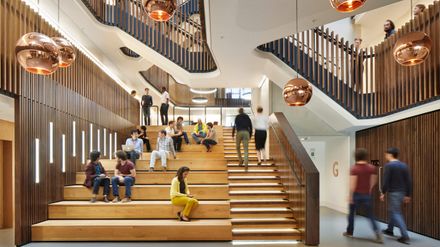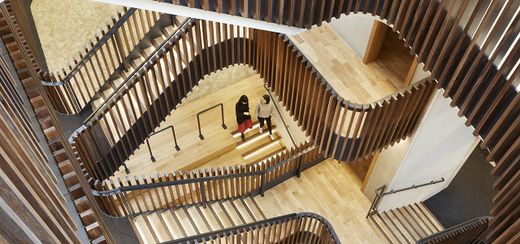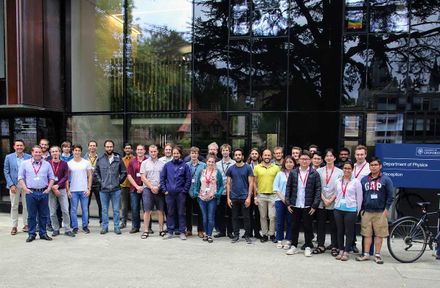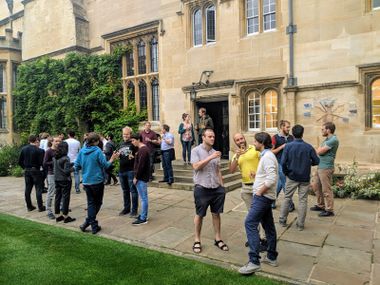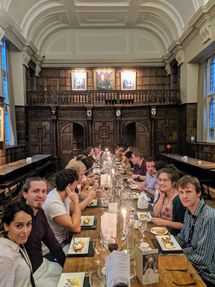OxDNA users and developers workshop 2024: Difference between revisions
(Created page with "e are planning to hold an oxDNA users and developers workshop in Oxford from September 2-5 2019. The aim of the workshop is to bring together both developers and users of the oxDNA and oxRNA models not only to share current research projects, but also to set the agenda for the future development of the oxDNA and oxRNA models, code and infrastructure, as well as to identify (and begin to address) current shortcomings. Particular foci are likely to be inter-operability o...") |
No edit summary |
||
| Line 1: | Line 1: | ||
We are planning to hold an oxDNA users and developers workshop in Oxford from September 2-5 2014. | |||
The aim of the workshop is to bring together both developers and users of the oxDNA and | The aim of the workshop is to bring together both developers and users of the oxDNA, oxRNA and oxNA models not only to share current research projects, | ||
but also to set the agenda for the future development of the oxDNA and oxRNA models, code and infrastructure, as well as to identify (and begin to address) current | but also to set the agenda for the future development of the oxDNA and oxRNA models, code and infrastructure, as well as to identify (and begin to address) current | ||
shortcomings. Particular foci are likely to be inter-operability of DNA design and simulation tools, user-friendly tools to improve oxDNA accessibility for non-expert users. | shortcomings. Particular foci are likely to be inter-operability of DNA design and other simulation tools, see for example [http://tacoxdna.sissa.it/], and user-friendly tools to improve oxDNA accessibility for non-expert users, see for example [https://sulcgroup.github.io/oxdna-viewer/ oxview] | ||
===Location=== | ===Location=== | ||
[https:// | [https://www.physics.ox.ac.uk/ Department of Physics], University of Oxford ([https://goo.gl/maps/U61yvrBi1Zn9VKBr7 map]). | ||
<div style="text-align:left"> | <div style="text-align:left"> | ||
| Line 13: | Line 13: | ||
===Schedule=== | ===Schedule=== | ||
Attendees are welcome to give a short research presentation as part of the workshop. | |||
Monday, Tuesday am: Short research presentations from all/most attendees. These will help to highlight the range of work for which | Monday, Tuesday am: Short research presentations from all/most attendees. These will help to highlight the range of work for which | ||
| Line 26: | Line 26: | ||
Users to get help in utilizing more advanced code features. | Users to get help in utilizing more advanced code features. | ||
===Registration=== | ===Registration=== | ||
There are no registration fees. There will be a workshop dinner on Tuesday 3 September | There are no registration fees. There will be a workshop dinner on Tuesday 3 September | ||
A sign-up link will appear here soon. | |||
===Accommodation options=== | ===Accommodation options=== | ||
Bed and breakfast rooms at other colleges can be booked [http://conference-oxford.com/bb-self-catering here]. | Bed and breakfast rooms at other colleges can be booked [http://conference-oxford.com/bb-self-catering here]. | ||
===Travel=== | ===Travel=== | ||
The closest airport to Oxford is Heathrow, and the quickest transport from Heathrow airport to Oxford is via [https://airline.oxfordbus.co.uk/ coach]. More travel information can be found [https://www2.physics.ox.ac.uk/contacts/how-to-find-us here]. | The closest airport to Oxford is Heathrow, and the quickest transport from Heathrow airport to Oxford is via [https://airline.oxfordbus.co.uk/ coach] or by train [https://www.thetrainline.com/] | ||
More travel information can be found [https://www2.physics.ox.ac.uk/contacts/how-to-find-us here]. | |||
===Sponsors=== | ===Sponsors=== | ||
We are grateful for support from | We are grateful for support from EPSRC | ||
===Attendees=== | ===Attendees=== | ||
Attendees from the 2019 conference below: | |||
[[Image:oxDNAworkshop.jpeg|440px]] [[Image:oxDNAworkshop_Jesus.jpeg|380px]] [[Image:oxDNAworkshop_dinner.jpeg|215px]] | [[Image:oxDNAworkshop.jpeg|440px]] [[Image:oxDNAworkshop_Jesus.jpeg|380px]] [[Image:oxDNAworkshop_dinner.jpeg|215px]] | ||
__NOTOC__ | __NOTOC__ | ||
Revision as of 14:17, 25 April 2024
We are planning to hold an oxDNA users and developers workshop in Oxford from September 2-5 2014. The aim of the workshop is to bring together both developers and users of the oxDNA, oxRNA and oxNA models not only to share current research projects, but also to set the agenda for the future development of the oxDNA and oxRNA models, code and infrastructure, as well as to identify (and begin to address) current shortcomings. Particular foci are likely to be inter-operability of DNA design and other simulation tools, see for example [1], and user-friendly tools to improve oxDNA accessibility for non-expert users, see for example oxview
Location
Department of Physics, University of Oxford (map).
Schedule
Attendees are welcome to give a short research presentation as part of the workshop.
Monday, Tuesday am: Short research presentations from all/most attendees. These will help to highlight the range of work for which oxDNA is being used, tools that have been developed, and wish lists for future development.
Tuesday pm: Discussion-based sessions to define the agenda for future development and to identify key targets and outline plans for implementation.
Wednesday, Thursday: "Hackathon": Begin to address the simpler targets (e.g. improve documentation of newer features, incorporation of existing external utilities into oxDNA infrastructure, develop and test simpler utilities). Make detailed plans for future development and collaborations. Users to get help in utilizing more advanced code features.
Registration
There are no registration fees. There will be a workshop dinner on Tuesday 3 September
A sign-up link will appear here soon.
Accommodation options
Bed and breakfast rooms at other colleges can be booked here.
Travel
The closest airport to Oxford is Heathrow, and the quickest transport from Heathrow airport to Oxford is via coach or by train [2]
More travel information can be found here.
Sponsors
We are grateful for support from EPSRC
Attendees
Attendees from the 2019 conference below:
